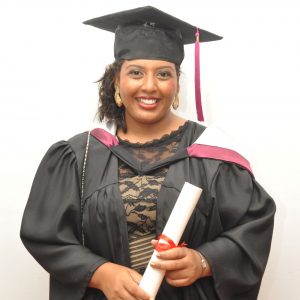
World Bank reports… Guyana’s migration of university graduates highest in the world
AT 89%, Guyana has the highest emigration rate of tertiary-educated nationals, aged 25 and older, in the world, Education Minister Dr. Rupert Roopnaraine noted on Saturday, citing a World Bank 2009 report. The Education Minister was addressing a ceremony for graduates of Nations University/Australian Institute of Business 2015 MBA programme at the Pegasus Hotel, Kingston.

Valedictorian of the Nations University/Australian Institute of Business, 2015 MBA Programme, Dr. Romona Morgan
The 2009 report titled, “A Gendered Assessment of Highly Skilled Emigration” by Frédéric Docquier, B. Lindsay Lowell and Abdeslam Marfouk found on the World Bank’s website, was an assessment of 195 countries in 2000, and 174 countries in 1990 on the migratory patterns of nationals from those countries to OECD (Organisation for Economic Cooperation and Development) countries. National censuses and registers of the receiving countries reinforced the information.
“Guyana, according to the World Bank… has the highest rate of migration of tertiary education graduates in the world,” Dr. Roopnaraine said, while lamenting, “Guyana has really allowed itself to become one of those cases where catastrophe has succeeded in remaining one stride ahead.”
This reality is compounded even further when the Education Minister related that Guyana is “at the bottom of the hemispheric pile in terms of the number of citizens between the ages of 18 and 30 who are enrolled in higher education.”
In an invited comment from the Guyana Chronicle, Vice-Chancellor (VC) of the University of Guyana, Professor Jacob Opadeyi noted the inevitability of students migrating: “I think the issue has to do with what I consider non-competitive wages and salaries that our graduates get from here.”
The VC is convinced that university graduates leave Guyana to work elsewhere because there are better salaries for their qualifications offered in other countries. “When you look at the salaries that people pay in other parts of the region, like Trinidad, it’s evident that they go for the higher salary.”
ENTREPRENEURSHIP
He reckoned the solution to the problem is for more development opportunities within the country, which would encourage graduates to not only remain in Guyana but also to become entrepreneurs wherever they can.
Asked about the role of the University of Guyana in solving the problem, Opadeyi said that role is “making sure that our programme is current, [and] making sure that our programme attracts
good jobs.”
“One of the things we are working on at the University,” he continued, “is to establish post-graduate programmes that would make them [graduates] want to stay and follow their education.”
He noted that there is room for the private sector to help in this development in supporting the University’s pursuit for developing programmes that are more relevant. To this end, the VC is hoping for support as the University embarks on developing E-Commerce, and Animation programmes.
Director of the Nations University, Dr. Brian O’Toole, in an interview with this publication, agreed with both the Education Minister and the VC that the migration of graduates is a national concern but reassured his University’s commitment to solving that problem.
“One of the things we are trying to do in the course [MBA] is to see how people can respond to the challenges here. The project they had to do was to address an issue within their own organisation so that they are trying to bring some of these theories, some of these ideas into very practical issues that they are facing day by day and then see what is the way forward,” Dr. O’Toole said.
He said further that the result of this programme is “a very exciting synergy amongst the people from different groups who are trying to build a future with better prospects for Guyana.”
At the same time, O’Toole explained the inevitability of students migrating since “it’s a global world.” He remained optimistic however that graduates will see the problems within Guyana that need addressing and “they would come back and try and bring some of those ideas [learned overseas] to promote a better future.”
Valedictorian of the MBA programme, Dr. Romona Morgan, speaking with this newspaper, was excited to add an entrepreneurial component to her medical doctorate.
Dr. Morgan said she would continue her services at the National AIDS Programme Secretariat (NAPS), while declaring, “I think we as graduates have to think of creative ways to want to be here, and to invest in our country.”
According to the World Bank’s website, the emigration rate of tertiary educated shows the stock of emigrants living in OECD countries as a percentage of the country’s population, aged 25 and older, with tertiary education. OECD countries include Canada, the United States, and the United Kingdom.
By Derwayne Wills


